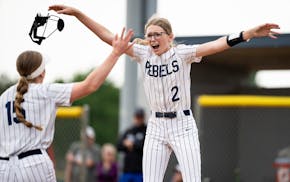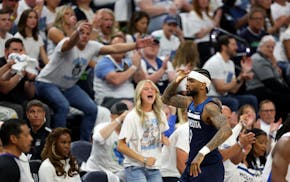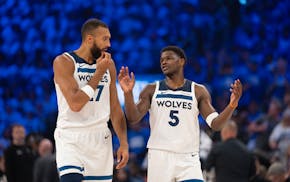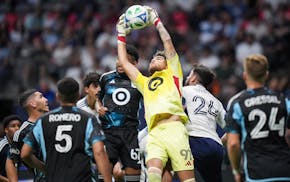PHILADELPHIA — The Eagles' 259 rushing yards in a 34-28 win Thursday night were the most against the Vikings since Alvin Kamara's six touchdowns led the Saints to 264 yards on Christmas Day 2020. On Thursday night, Philadelphia did it with few big plays to boost the total.
D'Andre Swift's 43-yard run in the fourth quarter set up the touchdown that effectively iced the game. The Eagles had three other runs of 10 yards or more (two by Swift and one by Boston Scott). But the majority of the Eagles' rushes were a model of mundane efficiency. Thirty-three of them were successful, meaning they gained at least 40% of the yards needed for a new set of downs on first down, at least 60% on second down and 100% on third or fourth down. Of their 48 run attempts in the game, just one went for negative yardage.
The Eagles' night, in other words, was a kind of template the Vikings have hoped to copy but so far have been unable to imitate.
Heading into Kevin O'Connell's second season as head coach, the watchword for the Vikings offense was efficiency. They signed tight end Josh Oliver to a three-year, $21 million contract, extended fullback C.J. Ham's deal and made Alexander Mattison their No. 1 running back, picking his ability to consistently make progress toward a new set of downs over Dalvin Cook's explosiveness. The moves, the Vikings hoped, would result in greater success on early downs and put Kirk Cousins in more favorable third-down situations while luring defenses into heavier packages the Vikings could exploit with Justin Jefferson.
The Vikings, who ranked 25th in the league in average rushing yards before contact in 2022, kept the same offensive line they had last season. The NFL schedule started them with two games against teams with imposing defensive fronts (Tampa Bay and Philadelphia). In those two games, they ran the ball just 26 times and gained only 69 yards on the ground through two games.
They are one of two teams in the league to have played two games. Of the remaining 30 that have played just once, 17 teams still have more rushing attempts than the Vikings, and 26 have more yards.
O'Connell said Friday the Vikings had called four or five more runs against the Eagles, but had changed those to passes because they saw opportunities for a productive pass play. Instead of running on their second offensive play, they opted for a quick pass to Justin Jefferson as a chance to get the receiver the ball in space. For the coach, it's not as simple as just running the ball more, especially when a failed run means possibly ending a drive early or taking opportunities away from a skilled passing game.
"Right now, we need to run the football more, but our yards per carry is not justifying doing that, other than just the overall landscape of how that helps your team," O'Connell said. "But third-and-7 plus on the road is not something that I'm going to continue to hunt by forcing things when our execution level is not what we need it to be.
The causes, and the effects, of the Vikings' ground game struggles seem to touch just about every area of their offense. All nine of their runs on Thursday night were on first down, and through two games they've executed just seven designed run plays on second or third downs: five Mattison handoffs, a Cousins sneak and the fumble against Tampa Bay when Ed Ingram knocked the ball out of Cousins' hand as he prepared to pitch it to Mattison.
Mattison lost a fumble on his first carry Thursday, with Avonte Maddox punching the ball out as the running back fell forward. On the Vikings' next series, Cousins appeared to call a check at the line of scrimmage, handing the ball to Mattison for the second time in the game. Davis beat backup center Austin Schlottmann clean off the line and brought Mattison down for a 2-yard loss.
"When you turn on the tape, it's something where you see a lot of plays where it's the old could've, would've, should've," O'Connell said. "We're one block away here or there from maybe being not only more efficient but have more significant gains, which is what we need to find. … That's schematics, that's player techniques and details, understanding where the run's supposed to hit, where our hat placement and body presence on the down lineman, and on to the second level needs to be. There's examples all over the tape of that needing to improve."
Of the Vikings' 20 second-down plays against the Eagles, they needed at least 9 yards for a first down on 13 of them. They went 6-for-10 on third downs Thursday, an impressive stat especially considering they had at least 9 yards to go on five of them. Cousins was hit on 10 of his 44 dropbacks against the Eagles, after the Buccaneers hit him nine times in 45 dropbacks on Sunday. And while the Eagles produced long drives that let them hold the ball for 39:28, the Vikings had it for just 20:32, denying their defense rest during its second game in five days.
"We just left them on the field way too much," O'Connell said. "We had the ability to sustain drives a lot of the night via the play pass, and winnings and matchups and that secondary. Didn't run the football well enough. I knew it would be tough being down some guys, but that's a really good front over there. You don't want to have to play that style against them, especially when you're turning the football over."
The simplest, most obvious reason the Vikings are 0-2 is their seven turnovers in two games. If they'd taken better care of the ball, they could certainly be 2-0, so perhaps it's not worth dwelling too long on any causes other than that one. Mattison, for what it's worth, has a 52.6% success rate on his 19 attempts this year, after his last three carries on Thursday went for 18 yards while the Vikings tried to rally.
But the Vikings began the year intending to operate differently on offense, and they've been unable to do so through two games. With two starters out on Thursday night and tackle Oli Udoh out for the season because of a torn quadriceps muscle, the Vikings need to rebuild their depth on the offensive line. Even when they have their starters back, they might have to confront deep-seated issues affecting their run game.
O'Connell said he would visit with General Manager Kwesi Adofo-Mensah and the team's scouting staff about options on the offensive line, while saying center Garrett Bradbury is progressing on his return from a back injury and adding that he hopes Christian Darrisaw will be able to return from an ankle injury next Sunday against the Chargers. Los Angeles was 28th in the league against the run a year ago, using the scheme with light defensive boxes that head coach Brandon Staley popularized when he was the Rams defensive coordinator practicing against O'Connell's offenses, so the Vikings might have opportunities to run with some consistency next Sunday.
"I do have a lot of confidence in our guys," O'Connell said, "but clearly we've got to do something a little bit differently and really focus on how to run the football better to help our pass game and how we are going about moving it."
The Eagles showed them how it can be done in a game in which the Vikings leaned on linebackers and defensive backs to limit Jalen Hurts' run-pass options but gave up consistent yardage to a team that safety Josh Metellus said was rarely changing up its calls.
"It was the same run play — gun near — just going straight uphill and not bouncing to the outside," Metellus said. "For us, it's just a mentality we've got to have. We've got to find a way to get to our foundations and our roots and find a way as a defense to stop them."
The same could hold true for a Vikings rushing attack that, through two games, has not been able to put its new approach on solid footing.

Champlin Park shuts out Rogers 1-0 to win Class 4A, Section 5 softball title

Steady stream of rainouts disrupting St. Paul Saints' season

Three key Timberwolves players could enter free agent market

Souhan: If Edwards is a franchise player, he needs to act and play like it


